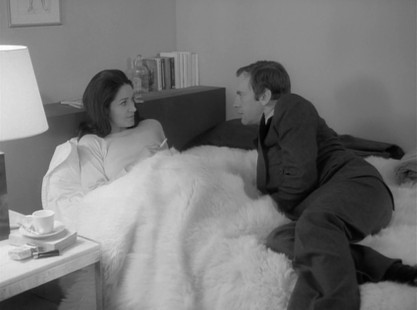Erich Rohmer (1969)
This is the Frenchest movie I have watched in a long while. Forget the fact that it takes place in France and that all the characters are French ; that’s trivial. The frenchfulness comes from what the characters say and do which is constantly so very Gallic. The term «bourgeois» is used repeatedly in that specific contemptible meaning only the French give it ; Pascal is referenced several times and one character salivates before his supposed intellectual magnificence. He is of course a left wing intellectual. I would almost expect croissants to come out of everyone’s mouths.
At the heart of My Night at Maud’s is the meeting between Jean-Louis Trintignant’s character and Maud, a friend’s friend. They meet for the first time for a three way Christmas dinner at Maud’s and Trintignant ends up staying the night. All night they talk of religion, love, sex, marriage and divorce. They quickly share intimate details of their lives and hearts. Whether this is a real intimacy born out of instinctive trust or the easy freedom one has for sharing secrets with strangers I am not sure. The conversation never becomes a vulgar simple seduction attempt. Both are genuinely interested in what the other has to say and are happy talking about themselves in open terms -they might have been craving an occasion to let «it» out. The dialogue feels genuine in how both parties deal with an odd situation and explore the boundaries of each other’s personal space -conversationally, physically, emotionally…
Trintignant must juggle his Catholic beliefs he strives to uphold and his apparent discomfort with a growing attraction to Maud. Maud is a freer spirit who would be content with one night’s companionship. Their relationship becomes something more for a short while but they never develop feelings for each other ; they’re merely having fun and seeking solace in each other’s arms. They are liberated by the fact that they know theirs is a relationship with no future.
I don’t know what to think of Trintignant’s Catholicism. He seems sincere in his belief but there are things to indicate his attendance at church is not wholly disinterested. He doesn’t like the more rigorous approaches to Catholicism and rejects Jansenism even though he doesn’t seem that much at odds with it to us. He must reconcile these beliefs with his attitude toward his love life and science -he is an amateur of probabilities. I never felt a yearning for the sublime or a deep rooted faith in Trintignant’s character ; his seems like a purely cerebral religiosity.
My difficulty connecting with him is perhaps my biggest problem with the movie. The ending of the movie is less believable because the emotion it should rest on doesn’t make it across the screen I will not say it is rushed because the point of the movie is not to tell that story ; what we have suffices. But by the end of the movie Trintignant still felt like an empty shell to me. I might just have a problem with the actor.
Trintignant ends up marrying and there is a final revelation that sheds light on his wife and their relationship. But I found his own reaction to the revelation more interesting. Did he want to hurt his wife ? Did he only want to remind her she wasn’t the only one with a past ? The marriage looked far from perfect, which is maybe why he will euthanize his wife in their Parisian apartment some 40 years later when she becomes paralyzed.
7.5/10

Recent Comments